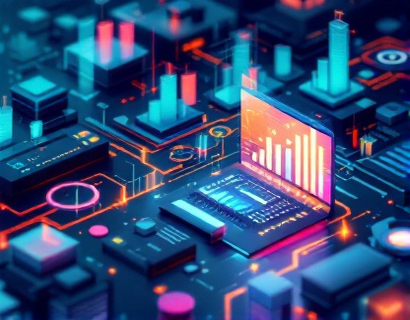Decentralized Marketing Dynamics: Harnessing AI and Crypto for Next-Gen App Promotion in the Digital Age
The digital landscape is rapidly evolving, driven by technological advancements in artificial intelligence and blockchain technology. This convergence is giving rise to innovative marketing strategies that are redefining how applications are promoted and consumed. In this article, we delve into the dynamics of decentralized marketing, exploring how AI and crypto are merging to create a powerful ecosystem for app promotion. This ecosystem is particularly beneficial for tech enthusiasts, early adopters of digital innovations, and anyone interested in productivity-enhancing tools.
The traditional centralized marketing models are being challenged by decentralized approaches that leverage blockchain's inherent transparency, security, and decentralization. These new models not only enhance trust and credibility but also offer more efficient and cost-effective ways to reach target audiences. At the heart of this revolution is the integration of AI, which brings unparalleled precision and personalization to marketing efforts.
Understanding Decentralized Marketing
Decentralized marketing, often associated with decentralized applications or dApps, operates on blockchain networks rather than traditional centralized servers. This shift has profound implications for app promotion. In a decentralized system, marketing efforts are distributed across a network of nodes, making it harder for any single entity to manipulate or control the flow of information. This democratization of marketing ensures that innovative apps can gain visibility without relying on gatekeepers or intermediaries.
The use of smart contracts in decentralized marketing automates and enforces agreements between parties, reducing the need for intermediaries and lowering transaction costs. For app developers, this means more control over their marketing strategies and a direct line of communication with their audience. Smart contracts can trigger marketing actions based on predefined conditions, ensuring that promotional efforts are timely and relevant.
AI in Decentralized Marketing
AI plays a crucial role in enhancing the effectiveness of decentralized marketing. Machine learning algorithms can analyze vast amounts of data to identify patterns and predict user behavior. This capability allows for highly targeted and personalized marketing campaigns that resonate with individual users. In a decentralized context, AI can help match apps with the most relevant audiences, optimizing engagement and conversion rates.
One of the key advantages of AI in decentralized marketing is its ability to operate autonomously. AI-driven bots and chatbots can provide 24/7 customer support, answer queries, and guide users through the app onboarding process. These AI tools not only improve user experience but also reduce the operational burden on developers and marketers.
Creating a Powerful Marketplace
The combination of AI and blockchain technology enables the creation of a robust marketplace for apps and services. This marketplace functions as a decentralized platform where developers can list their applications, and users can discover and engage with them. The platform's transparency ensures that all transactions and interactions are recorded on the blockchain, providing a tamper-proof record of activity.
For developers, this marketplace offers a level playing field, eliminating the need for approval from centralized authorities. It also provides valuable insights through data analytics, helping developers refine their apps based on user feedback and behavior. For users, the marketplace offers a curated selection of high-quality apps, tailored to their needs and preferences.
Benefits for App Developers
Developers benefit significantly from this decentralized and AI-driven marketplace. The platform reduces the barriers to entry, allowing new and innovative apps to gain visibility without the need for substantial marketing budgets. The use of smart contracts ensures that developers receive fair compensation for their work, based on pre-agreed terms.
AI-powered tools can assist developers in optimizing their apps for better performance and user engagement. By analyzing user data, AI can suggest improvements and feature enhancements, helping developers stay competitive. The marketplace also provides a community-driven feedback loop, where developers can interact directly with users to gather insights and iterate on their apps.
Benefits for Users
Users gain access to a diverse range of apps that are vetted and recommended based on their interests and behavior. The decentralized nature of the platform ensures that user data is handled securely and transparently, enhancing trust and privacy. AI-driven recommendations make it easier for users to discover apps that align with their needs, improving their overall digital experience.
Moreover, the community aspect of the marketplace fosters a sense of belonging and collaboration. Users can rate and review apps, contributing to a collective intelligence that helps others make informed decisions. This community-driven approach also encourages developers to continuously improve their apps, fostering a culture of innovation and quality.
Case Studies and Real-World Applications
To illustrate the potential of decentralized marketing dynamics, let's consider a few hypothetical scenarios. Imagine a productivity app that uses AI to analyze user work patterns and suggests custom productivity tools within the app. This app is listed on a decentralized marketplace, where it reaches users who have shown interest in similar productivity solutions.
The smart contract governing the marketing agreement ensures that the developer receives a payment only when the user actively engages with the app, measured through specific metrics such as time spent or tasks completed. This model aligns the interests of developers and users, promoting high-quality, user-centric apps.
Another example is a health and fitness app that leverages AI to create personalized workout plans based on user data. The app is promoted through the decentralized marketplace, targeting users who have expressed interest in fitness and wellness. The marketplace's AI algorithms ensure that the app is shown to users who are most likely to benefit from and engage with it, maximizing its success.
Challenges and Future Prospects
While the potential of decentralized marketing dynamics is immense, there are challenges to overcome. One of the primary hurdles is the technical complexity involved in implementing blockchain and AI solutions. Developers need to have a solid understanding of these technologies to fully leverage their benefits.
Another challenge is the regulatory landscape. As decentralized platforms operate across borders, navigating varying legal requirements can be complex. However, the transparency and security offered by blockchain can help build trust with regulators and users alike.
Looking ahead, the integration of AI and blockchain in marketing is poised to become even more sophisticated. Advancements in machine learning and quantum computing will further enhance the capabilities of AI, making marketing efforts more precise and effective. The adoption of decentralized finance (DeFi) principles can also open new avenues for funding and monetization within the marketplace.
Conclusion
The convergence of AI and blockchain technology is transforming the way apps are marketed and consumed in the digital age. By leveraging the strengths of decentralized marketing and AI, a new era of app promotion is emerging, one that is more transparent, secure, and user-centric. For tech enthusiasts and early adopters, this represents an exciting opportunity to engage with innovative tools that enhance productivity and simplify daily tasks. As the ecosystem continues to evolve, the potential for groundbreaking applications and services is limitless.










































